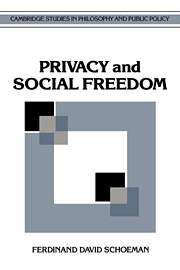Book contents
- Frontmatter
- Contents
- Acknowledgments
- Introduction
- 1 The meaning and scope of privacy
- 2 Mill's approach to social freedom
- 3 Articulated rationality and the Archimedean critique of culture
- 4 Social freedom from the perspective of cognitive and social psychology
- 5 The importance of cultural authority for morality
- 6 Explaining privacy's place
- 7 The ascent of privacy: a historical and conceptual account
- 8 Privacy and gossip
- 9 Privacy and spheres of life
- 10 Spheres of life: a literary exploration
- Epilogue
- Notes
- Index
8 - Privacy and gossip
Published online by Cambridge University Press: 23 October 2009
- Frontmatter
- Contents
- Acknowledgments
- Introduction
- 1 The meaning and scope of privacy
- 2 Mill's approach to social freedom
- 3 Articulated rationality and the Archimedean critique of culture
- 4 Social freedom from the perspective of cognitive and social psychology
- 5 The importance of cultural authority for morality
- 6 Explaining privacy's place
- 7 The ascent of privacy: a historical and conceptual account
- 8 Privacy and gossip
- 9 Privacy and spheres of life
- 10 Spheres of life: a literary exploration
- Epilogue
- Notes
- Index
Summary
We humanize what is going on in the world and in ourselves only by speaking of it, and in the course of speaking of it we learn to be human.
(Hannah Arendt)There is a puzzle connected with my treatment of privacy that I feel obliged to explore. In the process of exploring the puzzle, we shall have an opportunity to see how privacy interacts with another social category, though one that seems to be at cross-purposes with privacy. I have been arguing that privacy, in one of its important and characteristic roles, insulates people from inappropriate manifestations of social pressure. (Whether a manifestation of social pressure is “inappropriate” is socially and historically variable.) Gossip involves bothering with parts of a person's life that are characteristically none of one's business and introduces an indirect form of social pressure that privacy norms would seem designed to exclude. In contrast to violations of privacy, gossip, though not directed to the individual discussed, does precisely what it would be rude to do directly to the person: discuss what is none of someone's business. Furthermore, gossip gives informational access to an individual in apparent violation of that individual's private domain. In a culture where people know that others gossip, the very social pressure from which we think it is privacy's role to insulate a person is unleashed, though in an attenuated form.
- Type
- Chapter
- Information
- Privacy and Social Freedom , pp. 136 - 150Publisher: Cambridge University PressPrint publication year: 1992
- 1
- Cited by

